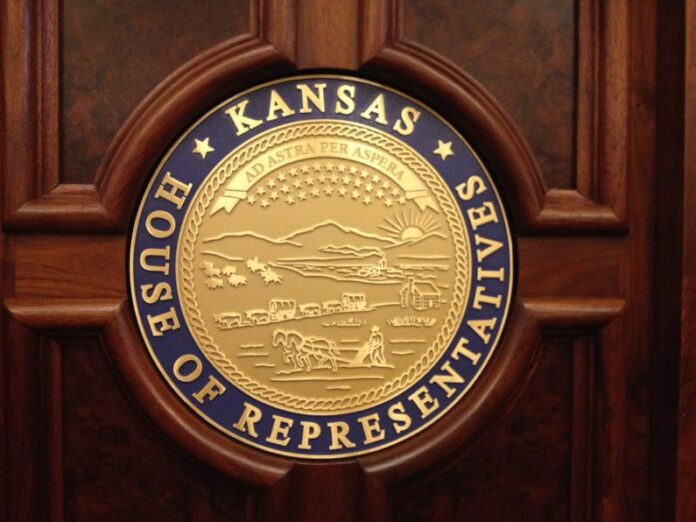(Updated to reflect final vote and new comments from House majority leader, other lawmakers)
A bill that bans foreign interests from “countries of concern” from owning or acquiring land within 150 miles of a military base located in Kansas or an adjacent state won approval in the House on Wednesday.
The bill now goes to the Senate where a similar but different bill proposed by Republican Attorney General Kris Kobach died in committee. Kobach has been openly critical of the version of the bill passed by the House.
The chamber voted 84-39 to approve the bill over objections from Democrats who said the bill is discriminatory and is an overreaction similar to how the United States has responded to perceived threats in the past.
Supporters say the bill is about protecting the country’s national security interests against six “countries of concern” that are identified in the legislation as China, Cuba, Iran, North Korea, Russia, Venezuela or an organization listed on the federal foreign terrorist list.

“This bill is just one more in an unfortunately long history of Asian-American exclusion,” said Democratic state Rep. Rui Xu, a Chinese-American from Westwood.
“Each time, they say this is in the interest of national security. Each time they say it’s a new world, we have to watch out for people that look like that,” Xu said.
“Each time, the Asian American community is reminded that we’ll always be looked at as outsiders in the American fabric,” he said.
“This bill, intentional or not, paints a picture that people from certain parts of the world are not to be trusted.”
Republican state Rep. Patrick Penn of Wichita said the bill was about getting out in front of any potential security threat, calling it a “well-measured approach for security.”
He took exception to the idea that the bill had racist undertones.
“To conflate it with any insinuation of racism is beyond the pale,” Penn said.
“To conflate it with anything outside of the best auspices of trying to take care of our families, our constituents and our citizens is beyond the pale,” he said.
“I reject that type of temperament, that type of talk out of hand,” he said.
The bill was backed by House Majority Leader Chris Croft.
He said the nations identified in the bill have shown that they are invested in harming American interests through tactics such as personal data and intellectual property theft.
“Kansas is home to high-value critical infrastructure and essential military installments, setting us up to be a prime target for foreign adversaries,” Croft said.
“Proactive action must be taken to ensure the safety and security of not only Kansans, but citizens across the nation,” he said in a statement.
Democratic state Rep. Jason Probst of Hutchinson said throughout history, there has always been a presence of some kind of foreign threat to the United States – “and sometimes if it’s not present, we sure invent it.”
“A lot of things in our history have begun with fear,” Probst said. “We don’t have a great track record of behaving responsibly when we’re afraid.”
Probst pointed to how Japanese were confined to camps in World War II and Germans were similarly confined during World War I – “all to protect America from a foreign threat.”
“Here we are today,” Probst said.
Republican state Rep. Pat Proctor of Leavenworth, who teaches a course at Wichita State University about the United States’ response to foreign threats, agreed that the country can sometimes overreact.
“There are some dark spots in our history,” Proctor said, “but I do not believe that this bill falls into that category in any way.
“We have an opportunity today to begin to address this issue and keep Americans, keep Kansans safe,” he said.
Democratic state Rep. Boog Highberger of Lawrence questioned just how much of a threat foreign landownership presented Kansas.
He pointed a report that a Kansas State University researcher gave to lawmakers last year that identified just 160 acres in Kansas held by Chinese interests, including land purchased together by a Russell County couple.
The researcher said there were 68,000 acres held by private foreign interests, including 14,456 owned by German interests and 11,820 owned by the Netherlands. China was last on the list with 1 acre.
The researcher said there was a half acre of property that was purchased together by a man who married a woman from China in Russell County.
Another 160 acres was owned by Syngenta, an agriculture company which has Chinese ownership but is headquartered in Switzerland.
Republican U.S. Rep. Jake LaTurner praised the House for passing the bill.
“We can’t stand by and let the Chinese Communist Party steal from, bully, and spy on Kansans right in our own backyard,” LaTurner said in a statement.
The bill passed by the House stipulates that any foreign principal from a “country of concern” that owns or acquires an interest in nonresidential property within the 150-mile radius of a base would have to register with the attorney general no later than 90 days after July 1, or the date the interest is acquired, whichever is later.
All registered property would be required to be divested no later than 360 days after this July 1, or the date the interest is acquired, whichever is later.
Any property that fails to be registered would be required to be divested no later than 180 days after this July 1 or the date such interest is acquired, whichever is later.
The attorney general would be required to investigate any reports of a violation of the law.
If the attorney general found a violation, he could go to court to enforce the law.
The attorney general could seek civil forfeiture of the defendant’s interest in the property or a court order directing divestiture of the property.
The bill would include exemptions for foreign principals who have received federal national security clearances.

Croft disputed any suggestion that the state was tackling a federal issue.
“I believe it is all of our issues. I think it’s something for all of us to care about,” Croft said.
“This is not a partisan issue in my mind. This is about an issue of survival.
“We can no longer sit by idly and allow our foreign adversaries to be undermining our state and our security,” he said.
Croft stressed that the bill includes a defined process that gives any landowner their day in court.
“We will still welcome foreign companies that want to be good partners and good corporate partners,” he said.
Croft’s bill was one of several introduced in the Legislature this year addressing foreign land ownership.
Republican Attorney General Kris Kobach had a proposal to ban foreign land ownership, but it hit a wall in the Kansas Senate last week without getting a committee vote.
Kobach’s bill would have banned all foreign nationals and any company owned or controlled by a foreign government from owning property larger than 3 acres. It also would have covered lease agreements.
Kobach’s bill would have created a land council that would have reviewed requests for waivers from the ban, something that some Republicans saw as an expansion of government.
A broad range of groups representing agriculture, bankers, chambers of commerce and civil liberties advocates turned out to testify against the bill during a hearing in February.
Kobach issued a statement late Tuesday raising legal questions about the House bill.
“While I applaud the House for addressing the threat posed by foreign land ownership in Kansas, there are problems with the House bill that I hope will be addressed in conference committee,” Kobach said.
“In its current form, this bill will be very difficult to defend in court.”
Croft said he was confident the bill would stand up in court.
“This bill was drafted with extreme care and the input of legal experts from across the nation to ensure that it can withstand a court challenge,” Croft said in a statement.
“While it’s disappointing to see these efforts dismissed before we have even taken final action, I remain confident that this legislation will pass constitutional muster.”
















